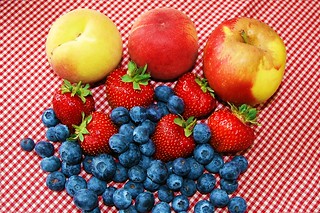Not only are smoothies a quick and easy way to get something in your belly for breakfast or a snack, they are also packed full of nutrition. Or, at least they can be if you choose the proper ingredients – for this discussion, fruits and vegetables.
| (Photo credit: Wikipedia) |
For instance, spinach is one of the super-foods we know we should add to our diet more often. But how many times can you eat spinach in a week? Probably not as often as you'd like for the nutrition spinach has to offer. But, you could add smoothies made with spinach to your diet, even every day without getting tired of it as long as you switched up the other ingredients each time.
That's just one example. How would you like to add four, five, or more servings of fruits and vegetables in just one smoothie? Add apples, berries, kale, kiwi, and even broccoli to a smoothie for breakfast, lunch, dinner, or a snack in between.
Once you discover how easy it is to blend up enough servings of fruits and vegetables to meet your recommended daily allowance, you'll be looking for all sorts of ways to include more fresh produce to your diet.
The great news is, along with the dietary fiber that fruits and vegetables offer, you'll also get loads of some pretty important vitamins, too. Here is a short list of just a few of the vitamins you'll get when you add fruits and vegetables to your diet. Of course, this is not a complete nutritional outline - it’s just a list of a few to give you an idea of how smoothies can make you healthier.
Vitamin C
Probably the first vitamin you think of when discussing fruits and vegetables is this one. This vitamin plays a huge role in helping your body fight off illness because it acts as an antioxidant. It also is a key component to metabolize protein.
Fruits with vitamin C include strawberries, kiwi, grapefruit, oranges, and pineapple.
Vegetables with vitamin C include broccoli, kale, squash, and Brussels sprouts.
| (Photo credit: the_moment) |
Another powerful antioxidant, this vitamin is needed to help fight free-radicals, which are the internal and external stressors that cause cell damage, causing illness and premature aging.
Fruits with vitamin E include blueberries, raspberries, peaches, pomegranates, and mangoes.
Vegetables with vitamin E include Swiss chard, potatoes, squash, and pumpkin.
Vitamin K
This vitamin is important for our body because it plays a crucial role in blood clotting. It also is needed for proper calcium absorption and bone health.
Fruits with vitamin K include raspberries, grapes, plums, pears, and blackberries.
Vegetables with vitamin K include cabbage, asparagus, broccoli, carrots, cauliflower, spinach, and kale.
Those are just three of the many nutrients you will enjoy when you drink a smoothie made with fresh fruits and vegetables. The list goes on and on.
Along with smoothies being an easier way to get your fruits and veggies, they are also a great way to get a quick protein boost - it's easy to add a scoop of high-quality protein powder
The nutritional value of a smoothie depends on the ingredients you choose to blend. If you’re drinking one smoothie a day filled with fresh fruits and vegetables, as well as some dairy, you will have a food that will help you meet your nutritional needs – and your health goals!
Check back later this week for some healthy & delicious smoothie recipes!



No comments:
Post a Comment
We welcome comments and suggestions!